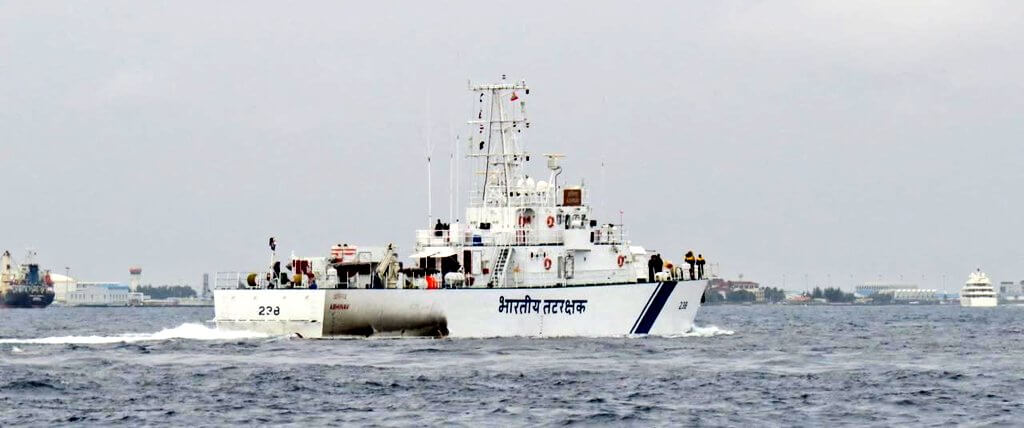Against the backdrop of a Chinese ‘research vessel’ arriving in the Maldives despite Indian concerns, India began a trilateral joint exercise, ‘DOSTI-16,’ with the Maldives and Sri Lanka on Thursday. India has objected to the arrival of the aforementioned vessel due to suspicions regarding Chinese intentions.
MNDF welcomes participating ships from India and Sri Lanka for the Trilateral Joint Exercise "DOSTI-16" from Feb 22-25. Coast Guards of Maldives, India, and Sri Lanka, along with observers from Bangladesh, join in this biennial event to enhance collaboration between the forces. pic.twitter.com/csAF51qTTl
— Maldives National Defence Force (@MNDF_Official) February 22, 2024
‘DOSTI-16’ Trilateral Exercise
Indian Coast Guard Ship (ICGS) Samarth (with integral helicopter), ICGS Abhinav, and an ICG Dornier aircraft have arrived in Malé for the joint exercise. The Maldives National Defence Force welcomed the vessels from the Indian and Sri Lankan Coast Guards. The ‘DOSTI-16’ exercise will be held from 22-25 February.
Observers from Bangladesh will also join the biennial event, which is aimed at enhancing cooperation between the forces of the three participating nations. The exercise will explore ways for the three countries to work together in addressing maritime incidents. The exercise started as a bilateral event between India and the Maldives in 1991. In 2012, Sri Lanka became a part of the exercise.
Chinese Research Ship in Maldives
The Chinese marine research vessel arrived near Malé after spending over a month in close proximity to the island nation. As per Maldivian media, the ship was spotted close to Thilafushi. The Chinese government had requested the Maldives government to make necessary clearances to allow the vessel to make a port call in Malé. It started its journey on 14 January, a day after Maldivian President Mohamed Muizzu concluded his visit to China.
While the Foreign Ministry confirmed that the Chinese vessel would be arriving for the “rotation of personnel and replenishment,” in a statement on 23 January, it affirmed that the ship would not conduct any research when in Maldivian waters. The vessel was untraceable on common tracking sites after 22 January, and it was last spotted in the Java Sea off Indonesia.
The 100-meter-long vessel is used for distant water and deep sea surveys and has buoys that can provide real-time satellite information to the Chinese government.
Chinese marine research vessel, Xiang Yang Hong 03, which spent about a month near the Maldives Exclusive Economic Zone (EEZ), anchored off Thilafushi today.
— Adhadhu (@AdhadhuMV) February 22, 2024
The research vessel began its journey on Jan 14, 2024, and was not visible on common tracking sites starting from Jan 22.… pic.twitter.com/zZSuafoeh4
India’s Response
India, along with other countries, has raised concerns about the arrival of research vessels in the Indian Ocean as China expands its footprint in the region by building a network of military bases and ports in different countries. While these are not military ships, New Delhi is worried about the military use of their research.
While Beijing claims that the operations of its vessels are ‘peaceful’ and in line with the UN Convention on Law of the Seas (UNCLOS), there are concerns that China is using its vessels to collect data for its submarine operations. At least 48 scientific research vessels have been deployed in the Indian Ocean since 2019, focusing on the Indian coastline and the deep Indian Ocean.
India has also raised concerns over Chinese research ships in the Indian Ocean region with Sri Lanka. Owing to Indian opposition, this January, Colombo denied entry to Chinese research vessel Xiang Yang Hong 3. Additionally, it announced a moratorium on foreign research vessels entering Sri Lankan waters for a year.
The Maldives is located barely 70 nautical miles from Minicoy, an island in Lakshadweep, and 300 nautical miles from mainland India. India has been wary of losing its dominance in the archipelagic nation to China ever since pro-China President Mohamed Muizzu came to power.

